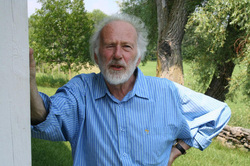
Once upon a time he was the “bad boy” of Canadian music, but today he’s an éminence grise, in his 80th year. And two performances of two very recent works, by a couple of Toronto’s leading new-music presenters – Soundstreams Canada and the Esprit Orchestra – shows that he’s still active on the contemporary music scene. As well, the two pieces nicely profiled different sides of Schafer: the outward-looking Citizen of the World; and the deeply rooted Canadian.
Indeed, the piece was bursting with “Schaferisms”: washes of choral colour, swooping vocal glissandi, and a broad ebb and flow to the music that’s unabashedly Romantic. (However, the harmonic language is more modern, lying at the edge of tonality.)
The Love That Moves the Universe was premiered by the Vancouver Chamber Choir a couple of years ago – and while it’s great to see the piece get a Toronto performance, Soundstreams’ own Choir 21, under David Fallis, sounded shaky and uncertain at times. There are, frankly, better choral forces in Toronto – and this score, with its tricky and exposed solo part-writing, calls for a highly polished group.
Happily, there was nothing shaky about Esprit’s performance of Schafer’s Wolf Returns, led by Alex Pauk, on Sunday (October 14). The performance was a world premiere, and featured not only Pauk’s orchestra but also a chorus of “wolves” from Schafer’s Wolf Project. It is hard to describe in a few words what a “wolf” is (in Schafer’s sense of the word). But if you imagine a mystical outdoor music-theatre work superimposed on a camping trip in the wilds of Ontario, that’s the Wolf Project – and “wolves” are people who participate in this annual ritual of Schafer’s creation.
Here, Schafer was writing for an amateur group of singers, and from the top balcony they chanted and howled their way through their episodic interjections with infectious enthusiasm. Down on stage, Pauk led his players through a bright, lively score that was lots of fun (a bit like Aaron Copland in places), yet did not lack for sophistication.
And there were plenty of other composers to be heard, in a wide range of musical styles and idioms. Co-incidentally, both Soundstreams and Esprit are celebrating their 30th anniversaries this year, so both presenters put together substantial programs to open their seasons. (And, inevitably, both concerts were preceded by lengthy speeches.)
Curiously, Soundstreams departed from its admirable tendency to build programs around stylistically complementary works, opting instead for a smorgasbord approach.
Steve Reich’s clever Clapping Music opened the concert, and his sonorously thrumming Mallet Quartet followed, in a first-rate performance by Nexus percussion ensemble. Fuhong Shi’s The Mountain Spirit, for soprano, strings and percussion, was an elegant yet evanescent setting of Chinese poems, prettily sung by Shannon Mercer.
The three movements selected for performance from Paul Frehner’s Berliner Konzert were energetic but dramatically overwrought. The more strenuously the Gryphon Trio and conductor Joaquin Valedpeñas pressed forward through the score, the more strenuous it all sounded.
Analia Lludgar’s Sentir de cacerolas was dripping with “new-musicky” clichés. (Percussionist scraping pots and pans? Check. Distracted atonal noodlings from a flute? Check. Bizarre outbursts from a soprano? Check.) After this, Arvo Pärt’s Orient & Occident for strings came as a welcome relief.
The Esprit Orchestra’s concert was also a stylistic smorgasbord – but in this case, the menu consisted entirely of Pauk’s favourite composers. (Over the years, he’s made it pretty clear who they are.)
The concert opened with Ikaros agog . . . Daidalos on Edge, a world premiere by John Rea. It was 20 minutes of anxious ruminations, with lots of slithering tremolos and trills – not my cup of tea, I have to say, but I believe it has an effective 10-minute piece buried inside it. For the Whales, by Iannis Xenakis, which came next, was an even more astringent study in texture and timbre. However, it did at least have the virtue of brevity.
Things improved as the concert progressed. Alexina Louie’s O Magnum Mysterium: In Memoriam Glenn Gould (re-orchestrated by Rea) is a fine essay for strings, deftly incorporating snippets of Bach. And, finally, Colin McPhee’s Tabuh-Tabuhan was a warm, glittering blast of Indonesian-inspired melody and colour.
I’ve said it before, and I’ll say it again: there’s a lot of new music that I don’t much like. So it’s unusual for me to attend two contemporary music programs in one week – and it comes as no surprise that some of the pieces I heard left me with no wish to hear them again.
In my experience, attending contemporary music concerts is like panning for gold: it’s inevitable that you’re going to have to sift through a lot of mud and gravel. But if you find a few precious nuggets, it can all be worth it.
© Colin Eatock 2012
 RSS Feed
RSS Feed

